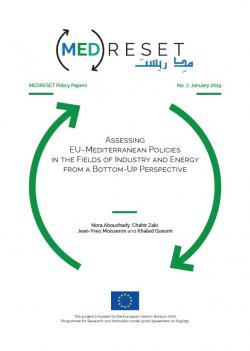Assessing EU–Mediterranean Policies in the Fields of Industry and Energy from a Bottom-up Perspective
The objective of this report is to evaluate the different EU policies in the industrial and energy sectors in four countries (Egypt, Lebanon, Morocco and Tunisia) based on assessment by local and European stakeholders, and to provide a list of policy recommendations based on these assessments. Adopting a bottom-up approach, such policies are evaluated in terms of their general conceptualization, how they have been implemented (instruments), in which sectors they have been channelled (substance) and how they have been tailored to different stakeholders (actors). Our main findings show that for industry, at the instruments level, most of the tools have targeted mainly trade and infrastructure, and – sometimes – macroeconomic stabilization rather than addressing industrial development and thereby contributing to job creation and inclusive growth. Concerning energy, despite the many instruments put in place by the EU in the region, local respondents were unable to name even one of the EU’s regional energy policies, platforms or initiatives. Furthermore, at the actors level, civil society was almost absent in tailoring and developing such policies. For industry, at the substantive level, most of the interventions did not directly target the industrial sector and when they did, they were channelled to low-value-added sectors leading to an insignificant effect on employment in general and women’s employment in particular. For energy, the scope of the EU policies remains timid and below the needs of the South Mediterranean countries. A different approach (with the civil society in the development stage; for women and in different sectors in the implementation stage) is essential for more effective policies.
-
Details
Rome, IAI, January 2019, 22 p. -
In:
-
Issue
Policy Paper 7
Introduction
1. Methodology
2. The Conceptualization of the Mediterranean
3. Evaluation of the EU’s Roles
3.1 Instruments
3.2 Substance
3.3 Actors
4. A Gender Lens towards EU Policies
Policy Recommendations
References



